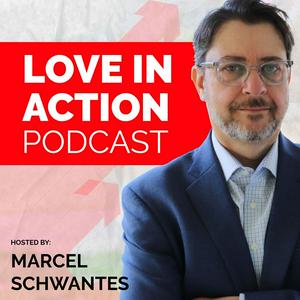Episode recap
Don’t forget Marcel’s special offer to join his Substack community for $8.00/month. Subscribe here: https://marcelschwantes.substack.com/subscribe
In this solo episode, Marcel argued that compassion is a core leadership strength, not a soft extra, and that alleviating others’ pain and suffering is a leader’s real work. Through examples like Jeff Weiner and Phil Lynch during 9/11, he showed how leaders who prioritize people, communicate openly, and make space for emotion build stronger, more connected organizations. When leaders show up in hard moments, teams heal faster and perform better.
Bio
Marcel Schwantes is a leadership coach, speaker, author, and advocate for more humane workplaces. He works with organizations that are tired of burnout, disengagement, and hollow cultures — and ready to build something better.
Marcel’s work includes:
Executive coaching
Leadership development programs for managers
Keynote speaking and workshops
Executive roundtables and culture strategy sessions
Marcel is the author of Humane Leadership: Lead with Radical Love, Be a Kick-Ass Boss. Whether coaching a CEO or training a leadership team, Marcel’s #1 goal is the same: To help leaders become the kind of people others want to follow.
Timestamps
[00:03] Why “soft skills” like compassion are actually essential leadership skills
[01:05] Command-and-control vs. compassion: why old leadership models fail
[02:00] Jeff Weiner on compassion as a lifelong practice, not a buzzword
[02:52] Dr. James Doty’s definition of compassion and the science behind it
[03:45] What compassionate leadership looks like in practice
[04:32] 9/11 and Reuters: setting the scene for Phil Lynch’s defining moment
[05:25] “People first, then customers, then the business” — a new priority in crisis
[06:20] Keeping people informed, safe, and emotionally supported
[07:15] Making space for grief, fear, and honest emotions at work
[08:10] How compassion shaped Reuters’ culture and rippled to customers
[08:30] Final reflection: Are you willing to be present with people when they’re suffering
Key Quotes
“If you want to measure yourself against the highest standard of leadership, you have to measure yourself against what people call the ‘soft stuff’—because it’s actually the hardest to master.”
“Compassion is not weakness. Some of the strongest people I know are the most compassionate.”
“Compassion is recognizing someone’s suffering—and then doing what you can to help ease it. It’s not hippy-dippy; it’s evidence-based and deeply human.”
“In the middle of absolute mayhem, Phil Lynch gathered his team and said: ‘People first, then customers, then the business.’ That’s compassionate leadership in action.”
“Leaders who create space for sorrow, confusion, and grief help their organizations heal and reconnect much faster.”
Key Takeaways:
Compassion is an essential leadership skill, not a soft extra.
Compassion is often dismissed as “soft,” but it is one of the hardest and most strategic skills to master. It directly impacts engagement, trust, and long-term performance.
Compassion is both recognition and action.
It’s not enough to notice someone’s pain. Compassion means seeing the suffering and intentionally acting to alleviate it—in conversations, decisions, and policies.
Science backs the power of compassion.
Research highlighted by Dr. James Doty shows compassion is a powerful antidote to loneliness, depression, anxiety, and addiction, all of which show up at work.
People-first leadership is clearest in crisis.
During 9/11, Phil Lynch’s mantra—“People first, then customers, then the business”—became a north star for Reuters. Compassion isn’t theoretical; it’s how leaders rank their priorities when it matters most.
Emotional transparency but safety and trust.
By being open about what he and his team were feeling, Lynch gave others permission to feel and express their own grief and fear, creating psychological and emotional safety.
Compassion shapes emotional culture.
When leaders intentionally make room for grief, questions, and honesty, they shape a culture where people feel seen, heard, and valued—and are proud to belong.
Love in action is a leadership practice.
Compassionate leadership is ultimately love expressed through behavior: how you decide, how you listen, how you show up for people when they’re struggling.
Conclusion
Marcel’s message in this episode is straightforward and challenging: the future of leadership is compassion in action. In a world where mental health struggles and emotional pain are everywhere, leaders can no longer hide behind metrics and control.
The story of Phil Lynch shows that when leaders put people first, especially in the darkest moments, they create cultures of trust, pride, and deep human connection. Compassion is not about being nice for its own sake; it is about being courageously present with suffering and choosing actions that reduce it.
If you want your organization to come alive from the inside out, start with one question: How am I shaping the emotional culture around me—and am I willing to be present when people hurt? That’s where real leadership—and love in action—begins.
Resources:
Guest Mentioned:
Dr. James Doty – Neurosurgeon and compassion researcher; previously featured on the show (link to that episode will be added to the show notes)
People Referenced:
Jeff Weiner – Former CEO of LinkedIn, advocate for compassion as a core leadership skill
Phil Lynch – Former president of Reuters America, whose leadership during 9/11 exemplified compassion in crisis
The book: https://www.amazon.com/Humane-Leadership-Lead-Radical-Kick-Ass-ebook/dp/B0CWG3PTL4/
Substack: https://marcelschwantes.substack.com/
LinkedIn: https://linkedin.com/in/marcelschwantes/
X: https://x.com/MarcelSchwantes
YouTube: https://youtube.com/@MarcelSchwantes1
Instagram: https://instagram.com/marcel.schwantes/
Dr. James Doty Episode: https://www.marcelschwantes.com/dr-james-doty-the-neuroscience-of-manifestation/


